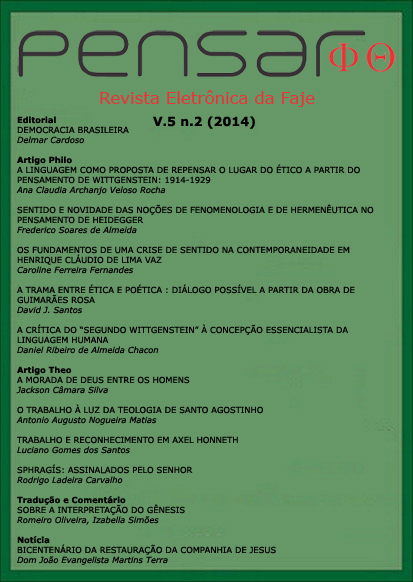TRABALHO E RECONHECIMENTO EM AXEL HONNETH
Palavras-chave:
Trabalho, reconhecimento, Axel Honneth.Resumo
O presente artigo tem por objetivo analisar o tema do trabalho e do reconhecimento no pensamento de Axel Honneth, filósofo e sociológo alemão da terceira geração da Escola de Frankfurt. O texto está dividido em duas partes: Teoria do Reconhecimento e Trabalho. O seu pensamento foi elaborado a partir das ideias do filósofo Hegel e do psicólogo americano George Herbert Mead. Há três relações de reconhecimento: amor, direito e solidariedade. Em contrapartida, encontram-se três formas de desrespeito: maus tratos, negação de direitos e degradação da dignidade humana. A luta por reconhecimento surge pelo desrespeito à dignidade do indivíduo. O trabalho é tema da teoria crítica do reconhecimento. Por meio do trabalho, o trabalhador encontra a sua sobrevivência e sua satisfação. O trabalho é forma de reconhecimento da identidade moral no contexto do mercado capitalista.
Abstract: This article aims to analyze the theme of work and recognition at the thought of Axel Honneth, German philosopher and sociologist of the third generation of the Frankfurt School. The text is divided into two parts: Theory of Recognition and Work. His thinking was developed from the ideas of the philosopher Hegel and American psychologist George Herbert Mead. There are three relations of recognition: love, law and solidarity. In contrast, there are three forms of disrespect: abuse, denial of rights and degradation of human dignity. The struggle for recognition arises disrespect to the dignity of the individual. The work is the subject of critical theory of recognition. Through the work, the worker finds its survival and satisfaction. The work is in recognition of moral identity in the context of the capitalist market.
Â





